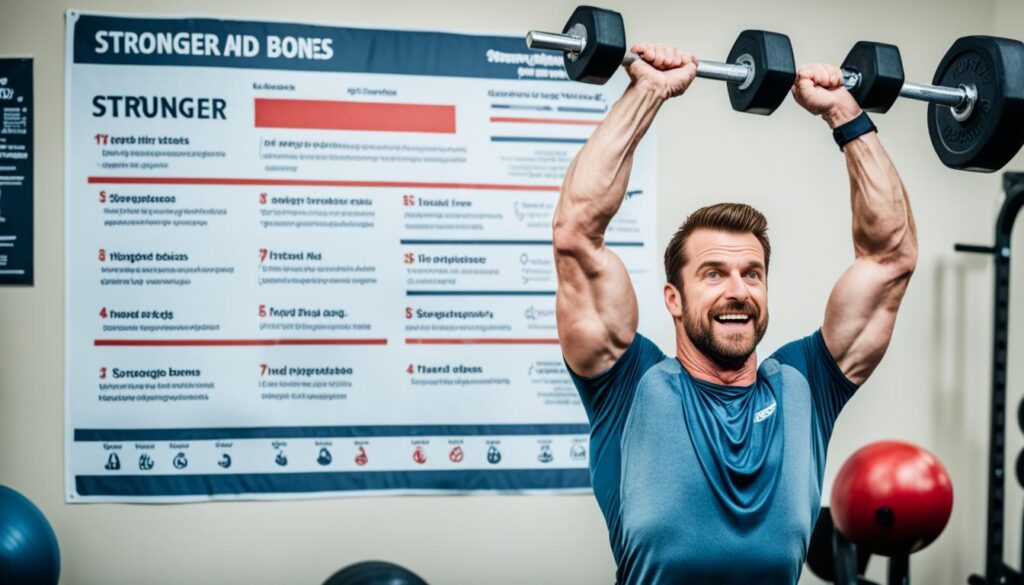Are you considering trying the HCG Diet for weight loss? You may be wondering if exercise is necessary or even allowed during this diet plan. The answer might surprise you. Keep reading to discover the exercise restrictions and guidelines for the HCG Diet.
Key Takeaways:
- The HCG Diet generally does not require exercise for successful weight loss.
- If you already have an exercise routine, you can continue it during the low-calorie phase of the diet.
- Starting with gentle activities like walking is recommended if you haven’t been exercising.
- Avoid strenuous activities to optimize weight loss during the low-calorie phase.
- Once you’ve completed the low-calorie phase, you can gradually increase your level of exercise.
Benefits of Exercise on the HCG Diet
While exercise is not required on the HCG Diet, incorporating physical activity can have potential benefits. Some individuals with physically demanding jobs have observed higher weight loss rates compared to those with sedentary lifestyles. Exercise can also provide additional energy and contribute to a positive mindset throughout the weight loss journey. However, it’s important to avoid muscle-building exercises during the low-calorie phase, as it can affect weight loss progress. Once you’ve completed this phase, you can gradually increase the intensity and duration of your workouts.
Regular exercise can have a profound impact on overall health and well-being. It can help improve cardiovascular health, increase muscle strength, and enhance mood. Additionally, incorporating exercise into your routine can aid in long-term weight maintenance and support your new lower weight.
The Role of Physical Activity
Exercise is not a requirement on the HCG Diet, but it can be a valuable addition to your weight loss journey. Here are some benefits of incorporating exercise:
- Higher weight loss rates for individuals with physically demanding jobs
- Additional energy during the weight loss process
- Improved overall health and well-being
- Enhanced cardiovascular fitness
- Increased muscle strength
Remember, it’s important to avoid muscle-building exercises during the low-calorie phase to optimize weight loss results. Once you’ve completed this phase, you can gradually increase the intensity and duration of your workouts to further enhance your fitness levels.
| Phase | Exercise Recommendations |
|---|---|
| Low-Calorie Phase | Avoid muscle-building exercises such as weightlifting Focus on low-impact activities like walking or light yoga |
| Post-Low-Calorie Phase | Gradually increase the intensity and duration of workouts Consider incorporating cardio exercises, strength training, and flexibility exercises |
Exercise on the HCG Diet can provide numerous benefits, but it’s essential to listen to your body and avoid overexertion. Finding a balance between exercise and calorie intake is key to ensuring successful weight loss and maintenance. Always consult with a healthcare professional or certified fitness trainer to develop a personalized exercise plan that aligns with your individual needs and goals.
Exercise Restrictions on the HCG Diet

During the low-calorie phase of the HCG Diet, it’s important to be mindful of exercise restrictions to optimize your weight loss journey. While regular physical activity is beneficial for overall health, certain types of exercises can be counterproductive during this phase. Understanding the exercise restrictions will ensure that you’re maximizing the effectiveness of the HCG Diet.
The Importance of Gentle Activities
When following the HCG Diet during the low-calorie phase, it’s advisable to avoid muscle-building exercise. This includes weightlifting, intense cardio workouts, and high impact exercises. The focus should be on engaging in gentle activities that promote movement and enhance general well-being. Examples of suitable exercises include:
- Walking
- Light yoga
- Low-intensity workouts
Engaging in these gentle activities supports your weight loss efforts without overexerting your body, which is already undergoing a significant calorie restriction on the HCG Diet.
Benefits of Avoiding Strenuous Activities
By avoiding strenuous exercises during the low-calorie phase, you allow your body to fully detox and focus on losing weight. Strenuous activities can put additional stress on the body, potentially hindering weight loss progress. It’s crucial to listen to your body and avoid overexertion to ensure a successful HCG Diet experience.
Exercise Restrictions on the HCG Diet
| Restricted Exercises | Recommended Alternatives |
|---|---|
| Weightlifting | Gentle stretching or light yoga |
| Intense cardio workouts | Low-intensity aerobic exercises |
| High impact exercises | Walking or low-impact workouts |
Listening to Your Body
While these exercise restrictions are in place during the low-calorie phase of the HCG Diet, it’s essential to always listen to your body. Pay attention to any discomfort or signs of overexertion. If you experience any adverse effects, it’s crucial to modify your exercise routine accordingly.
Remember, the HCG Diet is primarily focused on calorie restriction and enhancing weight loss. Following the exercise restrictions during this phase will help you stay on track and achieve your desired results.
Image: An image depicting exercise restrictions on the HCG Diet to optimize weight loss.
Exercise Guidelines for the HCG Diet
If you choose to exercise on the HCG Diet, it’s important to follow certain guidelines. During the low-calorie phase, it’s best to avoid muscle-building exercises and focus on low-impact activities that won’t hinder weight loss progress. These exercises include:
- Walking: This gentle activity is a great way to get moving without putting too much stress on your body. Aim for 20-30 minutes of walking a few times per week.
- Light Jogging: If you’re already comfortable with running, a light jog can be a suitable option. Just remember to start slowly and gradually increase the duration and intensity.
- Swimming: Swimming is a low-impact exercise that provides a full-body workout. It’s gentle on the joints and can help improve cardiovascular fitness.
- Cycling: Whether on a stationary bike or outdoors, cycling is another low-impact option that can help you stay active during the HCG Diet.
Remember to listen to your body and adjust your exercise routine accordingly. Start with shorter durations and lower intensities, and gradually increase them once you’ve completed the low-calorie phase. It’s important to find a balance that works for you and supports your weight loss goals.
| Exercise | Benefits |
|---|---|
| Walking | Improves cardiovascular health, helps burn calories, and maintains muscle tone. |
| Light Jogging | Increases aerobic capacity, improves overall fitness, and helps with weight management. |
| Swimming | Provides a full-body workout, reduces stress on joints, and improves flexibility and endurance. |
| Cycling | Builds strength and endurance, promotes weight loss, and improves cardiovascular health. |
Exercise Limitations on the HCG Diet

When it comes to exercise on the HCG Diet, there are certain limitations to keep in mind. The HCG Diet is a very low-calorie diet, and this restriction can impact your energy levels and overall physical performance. It’s important to be mindful of these limitations to ensure you have a safe and effective dieting experience.
One of the key exercise limitations on the HCG Diet is avoiding overly strenuous activities that can put additional stress on your body. Intense workouts or high-impact exercises can potentially hinder your weight loss progress and impede your body’s ability to adapt to the low-calorie diet.
To support your weight loss journey while on the HCG Diet, it’s best to prioritize gentle exercises that promote overall well-being without causing excessive fatigue. Focus on low-impact activities such as walking, light yoga, or other low-intensity workouts. These types of exercises can help improve your cardiovascular health, maintain muscle tone, and assist in your weight loss goals.
It’s also important to pay attention to your energy levels and adjust your exercise routine accordingly. While gentle exercises are encouraged, it’s crucial not to overexert yourself. If you feel excessively fatigued or experience any discomfort during your workout, it may be a sign to decrease the intensity or duration of your exercise session.
Remember, the HCG Diet is primarily focused on calorie restriction for weight loss, and exercise takes a secondary role during the low-calorie phase. Listen to your body, make sure to get enough rest, and consult with a healthcare professional before starting any exercise program while on the HCG Diet.
| Exercise Limitations on the HCG Diet |
|---|
| Avoid overly strenuous activities |
| Focus on gentle exercises |
| Prevent excessive fatigue |
| Listen to your body |
Increasing Exercise after the HCG Diet
Once you’ve completed the low-calorie phase of the HCG Diet, it’s time to gradually increase your level of exercise. By this point, your body will have adjusted to the weight loss and you can focus on enhancing your fitness levels while maintaining your weight. It’s important to listen to your body during this transition and avoid overexertion by gradually building up your exercise routine.
Increasing exercise after the HCG Diet offers several benefits. It helps to improve cardiovascular health, build muscle strength, and enhance overall fitness. Additionally, regular physical activity can boost your mood and promote a sense of well-being as you continue your weight maintenance journey.
When starting to increase exercise after the HCG Diet, it’s crucial to be mindful of your body’s capabilities and limitations. Begin with low-impact activities such as brisk walking, light jogging, or swimming. These exercises provide excellent cardiovascular benefits without placing excessive stress on your joints or muscles.
Note: It’s always a good idea to consult with a healthcare professional before starting any new exercise routine.
To help you develop a structured exercise plan, here’s a sample workout schedule to gradually increase your physical activity after completing the HCG Diet:
| Week | Exercise Routine |
|---|---|
| Week 1 | Three 20-minute brisk walks per week |
| Week 2 | Four 25-minute brisk walks per week |
| Week 3 | Two 30-minute light jogs and two 20-minute brisk walks per week |
| Week 4 | Three 30-minute light jogs and one 30-minute brisk walk per week |
| Week 5 | Two 35-minute light jogs, two 30-minute brisk walks, and one light yoga session per week |
Remember, the key is to gradually increase both the duration and intensity of your workouts over time. This approach allows your body to adapt and prevents excessive fatigue or strain.
Listening to your body is crucial as you increase your exercise routine. If you experience any pain, discomfort, or unusual fatigue, it’s essential to scale back and give your body time to recover. By being mindful and patient, you can create a sustainable exercise routine to support your long-term health and well-being.
Exercise and Weight Maintenance

Regular exercise is crucial for maintaining weight after completing the HCG Diet. Not only does it help burn calories, but it also aids in building muscle and improving overall fitness. However, it’s important to be mindful of how exercise can affect your weight on the scale.
When you engage in physical activity, your muscles may experience micro tears and store extra glycogen during the healing process. This can lead to temporary weight fluctuations. It’s essential to monitor your weight and make adjustments to your exercise routine if necessary to maintain your new lower weight.
Remember that the numbers on the scale don’t always reflect the changes happening within your body. While the scale may show slight variations due to muscle growth and glycogen storage, focus on how exercise makes you feel and the overall positive impact it has on your health.
To ensure effective weight maintenance, consider the following tips:
- Continue incorporating different forms of exercise into your routine, including cardio, strength training, and flexibility exercises.
- Set realistic fitness goals that align with your desired weight maintenance and overall health objectives.
- Listen to your body and give yourself proper rest and recovery time.
- Stay consistent with your exercise routine, making it a regular part of your lifestyle.
- Consult with a healthcare professional or a certified fitness trainer to personalize your exercise plan based on your unique needs and goals.
Remember, exercise not only plays a crucial role in weight maintenance but also offers numerous health benefits, improves cardiovascular health, builds strength, enhances mood, and reduces the risk of chronic diseases. Embrace exercise as a lifelong commitment to your health and well-being.
The Importance of Regular Exercise
“Exercise is essential for maintaining weight and overall health. It helps burn calories, build muscle, and improves cardiovascular fitness.” – Dr. Sarah Johnson
Exercising During the Maintenance Phase

During the maintenance phase of the HCG Diet, it is important to continue incorporating exercise into your routine to support weight maintenance and overall health. By finding a balance between exercise and calorie intake, you can avoid overexertion and the risk of weight gain.
It is crucial to monitor your weight and make adjustments to your exercise routine if you notice significant fluctuations (more than 2.1 pounds) due to exercise. The goal during this phase is to “lock in” your new lower weight, and adjusting your exercise routine can help achieve that.
| Exercise Tips during the Maintenance Phase |
|---|
| 1. Maintain a consistent exercise routine |
| 2. Focus on a variety of activities for overall fitness |
| 3. Adjust your exercise intensity and duration based on your energy levels |
| 4. Find workouts that you enjoy to maintain motivation |
| 5. Consider consulting a fitness professional for personalized guidance |
Remember, the maintenance phase is an ongoing journey. By continuing to prioritize exercise and mindful calorie intake, you can successfully maintain your weight and enjoy the benefits of a healthy lifestyle.
The Importance of Exercise for Health

Exercise is not only beneficial for weight loss and maintenance but also for overall health. Regular physical activity has numerous health benefits, including:
- Improved cardiovascular health: Exercise helps strengthen the heart and improve blood circulation, reducing the risk of heart disease and high blood pressure.
- Increased muscle strength: Engaging in strength training activities like weightlifting or resistance exercises helps build and maintain muscle mass, enhancing overall strength and mobility.
- Enhanced mood: Physical activity stimulates the release of feel-good hormones called endorphins, which can improve mood, reduce stress, and boost mental well-being.
- Reduced risk of chronic diseases: Regular exercise can help lower the risk of various chronic diseases, including obesity, diabetes, certain types of cancer, and osteoporosis.
Incorporating exercise into your routine can have long-lasting benefits beyond just weight management. It is a crucial component of a healthy lifestyle and plays a significant role in maintaining overall well-being.
| Benefit | Description |
|---|---|
| Improved cardiovascular health | Exercise strengthens the heart and improves blood circulation, reducing the risk of heart disease and high blood pressure. |
| Increased muscle strength | Engaging in strength training activities helps build and maintain muscle mass, enhancing overall strength and mobility. |
| Enhanced mood | Physical activity stimulates the release of endorphins, improving mood, reducing stress, and boosting mental well-being. |
| Reduced risk of chronic diseases | Regular exercise can lower the risk of obesity, diabetes, certain types of cancer, and osteoporosis. |
Exercise Guidelines for Long-Term Weight Management
Exercise plays a crucial role in a comprehensive long-term weight management plan. By incorporating a variety of exercises, including cardio, strength training, and flexibility exercises, you can achieve optimal results. It’s important to choose activities that you enjoy and are sustainable in the long run to maintain consistency and make exercise a part of your lifestyle.
Consulting with a healthcare professional or a certified fitness trainer can provide valuable guidance in developing a personalized exercise plan tailored to your individual needs and goals. They can help you create a plan that takes into account any specific limitations, preferences, or medical conditions you may have.
Regular exercise not only aids in weight loss maintenance but also offers numerous additional health benefits. It helps improve cardiovascular health, boosts muscle strength, enhances mood, and reduces the risk of chronic diseases. By making exercise a priority, you can experience long-lasting benefits beyond just weight management.
Remember, consistency is key. Aim to establish a routine that incorporates exercise into your daily life, making it a habit rather than a chore. By dedicating time and effort to regular exercise, you’re investing in your overall well-being and ensuring a successful long-term weight management journey.
Conclusion
After understanding the HCG Diet Exercise Restrictions and Guidelines, it’s clear that exercise is not a requirement for successful weight loss on the HCG Diet. Dr. Simeons, the creator of the diet, did not emphasize exercise in his manuscript. However, if you already have an exercise routine that your body is accustomed to and you don’t want to give it up, you can continue it during the low-calorie phase of the diet.
During the low-calorie phase, it’s important to avoid strenuous activities and focus on gentle exercises such as walking, light yoga, or low-intensity workouts. Strenuous activities can impede weight loss as they put additional stress on the body, which is already undergoing detoxification and losing weight on the very low-calorie diet.
Once you’ve completed the low-calorie phase, you can gradually increase your level of exercise. Regular exercise is essential for weight maintenance and overall health. It’s important to consult with a healthcare professional to ensure that your exercise routine aligns with your individual needs and goals. Remember to prioritize your well-being and choose activities that you enjoy to make exercise a sustainable part of your lifestyle.
FAQ
Do I need to exercise while on the HCG Diet?
Exercise is not required for successful weight loss on the HCG Diet. However, if you already have an exercise routine that your body is used to, you can continue it during the low-calorie phase of the diet. If you haven’t been exercising, starting with walking for 20-30 minutes a few times per week is recommended.
What types of exercise should I avoid on the HCG Diet?
During the low-calorie phase of the HCG Diet, it’s important to avoid muscle-building exercises such as weightlifting, intense cardio workouts, and high-impact exercises. The focus should be on gentle activities like walking, light yoga, or low-intensity workouts.
Can I increase my level of exercise on the HCG Diet?
Once you’ve completed the low-calorie phase of the HCG Diet, you can gradually increase your level of exercise. It’s important to listen to your body and adjust your exercise routine accordingly.
Are there any limitations to exercise on the HCG Diet?
Due to the very low-calorie nature of the diet, it’s important to avoid overly strenuous activities that can put additional stress on the body and potentially hinder weight loss. Gentle exercises that promote overall well-being are recommended.
What are the benefits of exercise on the HCG Diet?
While exercise is not required on the HCG Diet, incorporating physical activity can provide additional energy and a sense of accomplishment. Some dieters with physically demanding jobs have observed higher weight loss rates. However, it’s important to avoid muscle-building exercises during the low-calorie phase as it can affect weight loss.
How should I maintain my weight after the HCG Diet?
Regular exercise is essential for weight maintenance after completing the HCG Diet. It helps to burn calories, build muscle, and improve overall fitness. It’s important to monitor your weight and adjust your exercise routine if needed to maintain your new lower weight.
Can I exercise during the maintenance phase of the HCG Diet?
Yes, exercise is recommended during the maintenance phase of the HCG Diet to support weight maintenance and overall health. It’s important to find a balance between exercise and calorie intake to ensure you’re not overexerting yourself or risking weight gain.
What are the long-term benefits of exercise?
Regular exercise has numerous health benefits, including improved cardiovascular health, increased muscle strength, enhanced mood, and reduced risk of chronic diseases. Incorporating exercise into your routine can have long-lasting benefits beyond just weight management.
How should I exercise for long-term weight management?
For long-term weight management, aim for a combination of cardio exercises, strength training, and flexibility exercises. Find activities that you enjoy and can sustain in the long run. Consult with a healthcare professional or certified fitness trainer to develop a personalized exercise plan that suits your needs and goals.
Are there any specific exercise guidelines for the HCG Diet?
Exercise guidelines on the HCG Diet recommend avoiding muscle-building exercises during the low-calorie phase and gradually increasing the intensity and duration of your workouts once this phase is completed. Always listen to your body and adjust your exercise routine accordingly.
How important is exercise for overall health?
Exercise is essential for overall health. It improves cardiovascular health, increases muscle strength, enhances mood, and reduces the risk of chronic diseases. Incorporating exercise into your routine is beneficial beyond just weight management.




